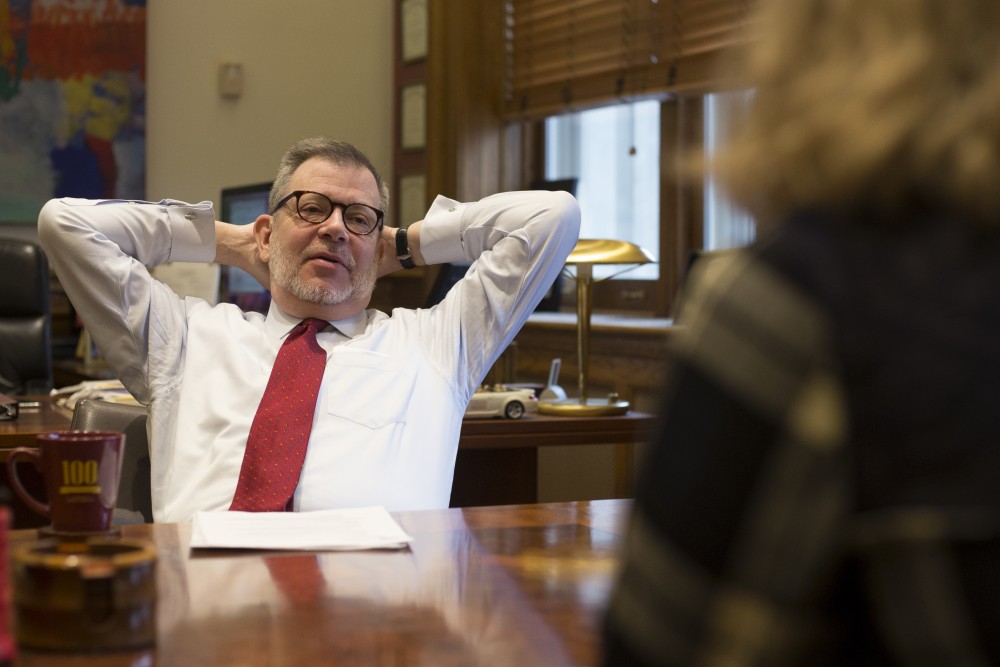The Minnesota Daily sat down with University of Minnesota President Eric Kaler to discuss tuition increases, the delay of a controversial fellowship and an increase in police presence around campus.
Do you have any fun plans for the summer?
[My wife Karen and I] are going on an academic exchange program to Israel next week and there are some University students in Israel… and we will meet them for dinner… And then we’ve got a couple of vacations scheduled later on, and we’ll go to Europe for a couple of weeks.
Across the nation, top officials at universities and student government leaders have voiced opposition to the PROSPER Act, which aims to reform the Higher Education act. If passed, how do you think the PROSPER Act will affect the University and what has been your response to it?
I join with my colleagues in opposition to the PROSPER Act. It cuts financial aid to students in almost incalculable, unknowable number of ways. The overall impact I think will certainly be a net negative and that will harm access to higher education for college students in America and that’s a terrible thing to do.
Following a 2016 University of Minnesota football scandal, nine players involved in the school’s investigation recently filed a lawsuit against the Board of Regents and yourself – citing gender and racial bias in the Office of Equal Opportunity and Affirmative Action’s investigation of sexual assault claims. What is the University’s response to the lawsuit?
Well obviously we don’t comment on lawsuits that are ongoing, but we will vigorously defend the University’s actions.
A survey by the University’s Academic Health Center Faculty Consultative Committee found a majority of faculty think the combination of the vice president of health sciences and the dean of medical school into one position could limit the administrator’s ability to be impartial toward other University health sciences schools. Conversations over if one person can hold both positions has since continued on for months. In March, you said you would review the position. What is your stance on this?
I continue to believe that a single senior person should be leading all of our health science activities and I believe that person can also be the dean of the medical school. However, we are restructuring the Academic Health Center in a variety of ways to streamline the reporting lines, and make the job more manageable.
The Second Precinct, including the Marcy-Holmes, Como and Prospect Park neighborhoods, has seen an increase in police presence, as well as areas around the University. Are you supportive of this increased police presence?
I’m hugely supportive of anything that improves quality of life and that includes safety around our campus. So obviously additional police enable more eyes on the street and their mere presence discourages criminal activity. That will improve the quality of life for our students, so I’m supportive of Minneapolis’ decision to put more officers into the second precinct and I appreciate them doing that.
Last month, the University of Minnesota delayed a reproductive rights advocacy fellowship, which included teaching abortion related training procedures. What was the reason for the delay?
We felt that the delay – which was a delay not a cancellation – was in order to provide an opportunity to consult with groups that were affected by that decision and have them better understand what it is we were doing. We certainly strongly support the reproductive rights of women and certainly understand the need to teach abortion methods as part of our medical training.
Does the University plan to continue the fellowship program after the one-year delay?
We’ll have some conversations with our stakeholders and move to a good point going forward but we haven’t made a final decision yet.
The Board of Regents recently passed a budget that includes a tuition increase for resident and out-of-state students. How do these tuition increases play into your long-term goals as President?
My long term goals have always been aligning access and excellence, and excellence requires investment. Our state appropriation for this second year of the biennium was actually $10 million lower than it was in the first year of the biennium, we unfortunately had to go to students and families and ask them for a modest increase in tuition. … We’ve worked very hard to control tuition increases, its an average annual increase of about 1 percent on the Twin Cities campus and four-tenths of a percent on all other campuses. That’s well below the rate of inflation… We will lead our next biennial with a request from the state that would enable us to hold tuition flat.
In a letter sent last week from the Office of the Board of Regents to student government leaders, the office stated it would deny the elected student representatives to the Board of Regents. This followed recent controversy among student government groups over the appointment process of student representatives for the Board of Regents. Do you have any comments on this ordeal?
…The Board of Regents provides four student representative seats from the Twin Cities campus and the Twin Cities students generated five nominees for four seats. So my view is that’s not the Board of Regent’s problem, that’s the student government’s problem to figure out which four students they’re going to advance and I’m quite certain when they advance four students the board will seat them.
We’ve heard your a big state fair fan, is there anything else you’re looking forward to this summer?
I am a big state fair fan… which reminds me I don’t think I have my concert tickets yet. I think I may be too late. This is quite worrisome. We will [also] take some vacation time [this summer]. We have a granddaughter who is 17 months old and we enjoy watching her grow up.









